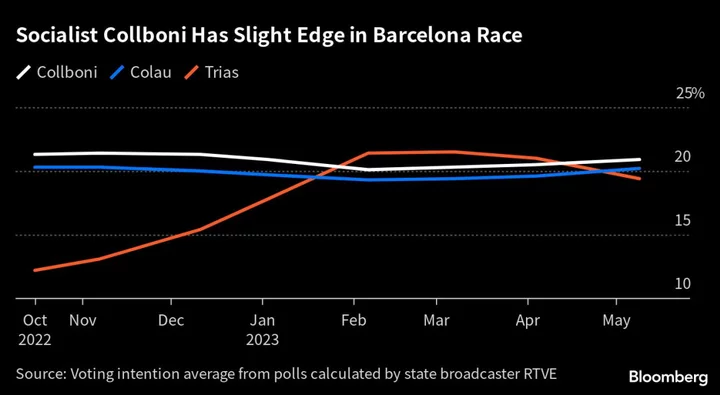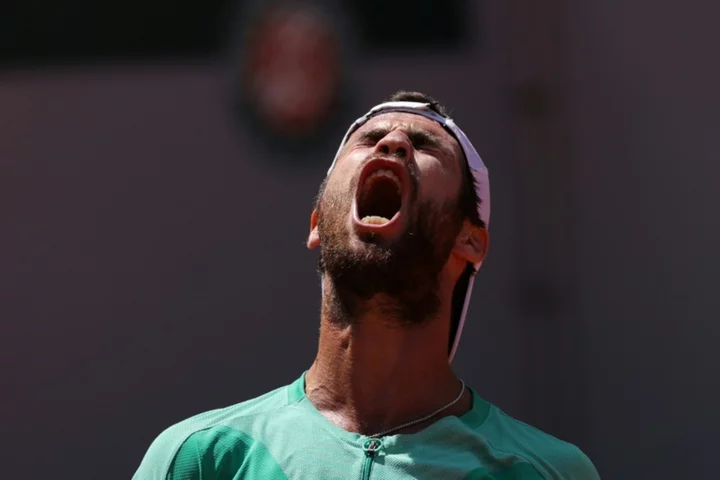Spanish government ministers are spending a lot of time in Barcelona. One or more of them has made the 1,000-kilometer (620-mile) round trip from Madrid every week since the start of the year.
Their devotion to the Catalan city reflects the delicate political balance in Spain as Prime Minister Pedro Sanchez tries to keep power in an election due in December. Before that, Spain votes in regions and municipalities this weekend, and winning the tight race for Barcelona would give Sanchez a boost with some polls showing his Socialist Party trailing in other battlegrounds.
It’s been more than five years since a constitutional crisis almost tore Spain apart and saw the former government seize control of Catalonia after a unilateral declaration of independence. Yet the politics of a region that accounts for 20% of the economy still looms large over a country trying to focus on addressing the financial challenges facing nations across Europe.
Victory for Sanchez in Barcelona would see his Socialists regain an electoral bastion lost to pro-independence forces during Europe’s debt crisis. It would also vindicate the 51-year-old premier’s risky strategy of rapprochement with the separatists despite resistance from within his party, according to two officials familiar with his thinking.
“Winning Barcelona now will send a strong message and allow Sanchez to raise the morale of his party troops ahead of the general election,” said Jose Pablo Ferrandiz, head of public opinion at pollster Ipsos in Madrid. “It could also help him secure governability by limiting the Catalonia conflict.”
Sanchez and his party machine have swung behind mayoral candidate Jaume Collboni, who was Barcelona’s deputy mayor until January. With the Socialists struggling in the regions of Valencia and Aragon, and Madrid controlled by the rival People’s Party, the city is the largest constituency where they have a good chance of winning.
Opinion polls show the Socialist Party has a narrow lead in a three-way contest. Ada Colau, 49, the incumbent, is vying to run the city for a third consecutive time. She’s an ally of Sanchez’s junior coalition partner, Unidas Podemos. Also in the running is Xavier Trias, a 76-year-old former mayor representing the hardline pro-independence party Junts per Catalunya.
“The government is putting its weight behind Barcelona because this is the window Spain has to normalize the situation in Catalonia,” Collboni, 53, said from a small room stacked with fliers in his campaign headquarters. “Winning Barcelona will be a giant step toward turning the page in Catalonia and assuring that Sanchez remains in office.”
For the millions of tourists flocking to Barcelona every year, the city is a symbol of Spain’s modern revival since hosting the Olympics in 1992. Yet the Gaudi architecture, beaches, famous football team and Michelin-starred restaurants mask a restless political era.
The Catalan Socialist party ruled the city practically uncontested from when Spain returned to democracy in the late 1970s until 2011. Discontent caused by austerity measures then catapulted the separatists into power in Catalonia, paving the way for the illegal referendum in 2017.
Governing with a minority coalition in Madrid since 2019, Sanchez has been forced to cut deals with Esquerra Republicana, one of the two parties behind the independence vote, in order to pass legislation. Infighting in the pro-independence camp then helped shift momentum behind the Socialists.
In 2021, Sanchez stunned rivals and allies by pardoning nine Catalan separatist leaders convicted of sedition. That year, the Socialists won the most seats in the Catalan parliament but failed to form a regional government.
“Collboni’s victory in Barcelona, even by the slightest of margins, would send a strong signal ahead of the general elections,” said Astrid Alemany, a Barcelona-based campaign strategist. “The socialists, in addition to recovering a stronghold 12 years later, would prevail over Catalan nationalism, endorsing its strategy of détente in the territorial conflict.”
Whoever retains or flips major districts will have an advantage in December’s election, which most polls show Sanchez losing to Alberto Nunez Feijoo’s People’s Party. Sanchez could still stay in office, though, if he can piece together an alliance with the far left and Catalan and Basque parties.
The People’s Party, whose government in 2017 triggered the article in the Spanish constitution to assert control over Catalonia, is expected gain some seats on Barcelona’s city council, though remain a marginal force.
In a January interview with news outlet Servimedia, Feijoo said Sanchez is putting Spain’s integrity at risk and promised to refocus on “territorial unity.” He also said he would reinstate sedition as a crime, which Sanchez abolished late last year.
The Socialists are now favored by many in the city’s business elite, who believe the party could cement the stability needed to bring back investors. The constitutional conflict reduced the number of companies planning to settle in Catalonia or raise capital there, according to a study by researchers at Universitat de Barcelona.
Earlier this year, Sanchez hosted French President Emmanuel Macron in Barcelona to push ahead with a deal to build a €2.5 billion ($2.7 billion) undersea pipeline as part of the nascent green hydrogen industry. Sanchez also personally intervened to persuade US technology company Cisco open a semiconductor design center in Barcelona, its first in the European Union.
“This is a great city and has been even greater when it was led by Socialist mayors,” Sanchez said at a campaign rally overlooking the Barcelona coastline on May 4. “With your vote, we can regain this better version of Barcelona.”









